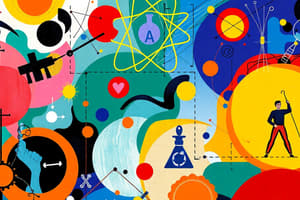Podcast
Questions and Answers
What is the purpose of standard systems of units in scientific measurement?
What is the purpose of standard systems of units in scientific measurement?
- To eliminate all uncertainties in measurements
- To favor certain measurements over others
- To restrict the types of measurements that can be made
- To ensure consistency and facilitate communication (correct)
Which of the following units is not commonly used in the SI system?
Which of the following units is not commonly used in the SI system?
- Pound (correct)
- Second
- Meter
- Kilogram
What drives scientific inquiry?
What drives scientific inquiry?
- The need for funding and resources
- Curiosity, skepticism, and the desire to understand (correct)
- Intuition and personal beliefs
- A strong reliance on past scientific achievements
What roles do ethical review boards play in scientific research?
What roles do ethical review boards play in scientific research?
Measurement always comes with a degree of uncertainty. Which of these is NOT a major factor contributing to this uncertainty?
Measurement always comes with a degree of uncertainty. Which of these is NOT a major factor contributing to this uncertainty?
Which branch of science focuses on the study of living organisms?
Which branch of science focuses on the study of living organisms?
What is the first step in the scientific method?
What is the first step in the scientific method?
What does reproducibility in scientific experiments ensure?
What does reproducibility in scientific experiments ensure?
Which of the following is a key characteristic of scientific hypotheses?
Which of the following is a key characteristic of scientific hypotheses?
Why is parsimony important in scientific explanations?
Why is parsimony important in scientific explanations?
What is meant by 'falsifiability' in a scientific context?
What is meant by 'falsifiability' in a scientific context?
What does the term 'causality' refer to in scientific inquiry?
What does the term 'causality' refer to in scientific inquiry?
What is a characteristic feature of scientific laws?
What is a characteristic feature of scientific laws?
Flashcards
Scientific Method
Scientific Method
A systematic way to understand the natural world through observation, experimentation, and analysis.
Empirical Evidence
Empirical Evidence
Data collected through observation and experimentation.
Testability
Testability
A scientific idea must be able to be tested through observation or experiment.
Reproducibility
Reproducibility
Signup and view all the flashcards
Falsifiability
Falsifiability
Signup and view all the flashcards
Objectivity
Objectivity
Signup and view all the flashcards
Parsimony
Parsimony
Signup and view all the flashcards
Scientific Laws
Scientific Laws
Signup and view all the flashcards
SI units
SI units
Signup and view all the flashcards
Scientific Inquiry
Scientific Inquiry
Signup and view all the flashcards
Uncertainty in measurement
Uncertainty in measurement
Signup and view all the flashcards
Ethical Considerations in Science
Ethical Considerations in Science
Signup and view all the flashcards
Data integrity
Data integrity
Signup and view all the flashcards
Study Notes
Branches of Science
- Science is a systematic enterprise that builds and organizes knowledge in the form of testable explanations and predictions about the universe.
- It is broadly categorized into various branches, each focusing on a different aspect of the natural world.
- Examples of scientific branches include physics, chemistry, biology, astronomy, and geology.
- These branches are interconnected, with discoveries in one area often informing and influencing others.
Scientific Method
- The scientific method is a systematic approach to understanding the natural world.
- It involves a series of steps, usually starting with observation and leading to experimentation and conclusions.
- Key steps include observation, question formulation, hypothesis generation, prediction, experimentation, data analysis, and conclusion formulation.
- The scientific method is iterative; conclusions may lead to new questions and a refinement of the method.
Key Concepts in Science
- Empirical evidence: Science relies on observations and experiments to gather data and test hypotheses.
- Testability: Scientific explanations must be testable through observation or experimentation.
- Reproducibility: Experiments and observations should be reproducible by other scientists to ensure validity.
- Falsifiability: A scientific hypothesis or theory must be capable of being proven wrong (falsified) through experimentation.
- Causality: Science aims to establish cause-and-effect relationships.
- Objectivity: Scientific observations and experiments must be conducted with minimal bias.
- Parsimony: The simplest explanation is generally preferred.
- Models and Theories: Scientific models and theories represent simplified versions of complex phenomena, used to make predictions and explain observations.
- Laws: Scientific laws describe patterns in nature, often expressed mathematically, that are consistently observed.
The Nature of Science
- Science is a process, not a body of facts.
- Science is constantly evolving as new data and interpretations emerge.
- Scientific understanding is always tentative and subject to revision.
- Scientific knowledge is based on evidence and is not absolute.
- Science addresses the natural world, excluding supernatural or non-empirical explanations.
- Science is a social endeavor with collaboration and discussion among scientists.
Scientific Measurements and Units
- Accurate measurement is crucial in science.
- Standard systems of units (e.g., SI units) are used for consistency and communication.
- Units quantify diverse physical quantities (e.g., length, mass, time, temperature).
- Important units include meters, kilograms, seconds, Kelvin, and others.
- Measurement always has an associated degree of uncertainty.
Scientific Inquiry
- Science involves asking questions about the natural world, designing experiments to answer those questions, collecting and analyzing data, and drawing conclusions.
- This process is driven by curiosity, skepticism, and a desire to understand the underlying mechanisms of the universe.
- Scientists must evaluate potential biases and ensure that observations are accurate and reliable.
Ethical Considerations in Science
- Scientific research must be conducted ethically, considering the potential impacts on human health, the environment, and society.
- Codes of conduct and ethical review boards help ensure responsible research practices.
- Issues like animal welfare, data integrity, informed consent, and conflict of interest should be taken into account during research.
Studying That Suits You
Use AI to generate personalized quizzes and flashcards to suit your learning preferences.
Description
This quiz explores the fundamental branches of science, including their definitions and interconnections with each other. Additionally, it covers the scientific method, emphasizing its systematic approach to inquiry and experimentation. Test your knowledge of key concepts in science and understand how various disciplines interact.




